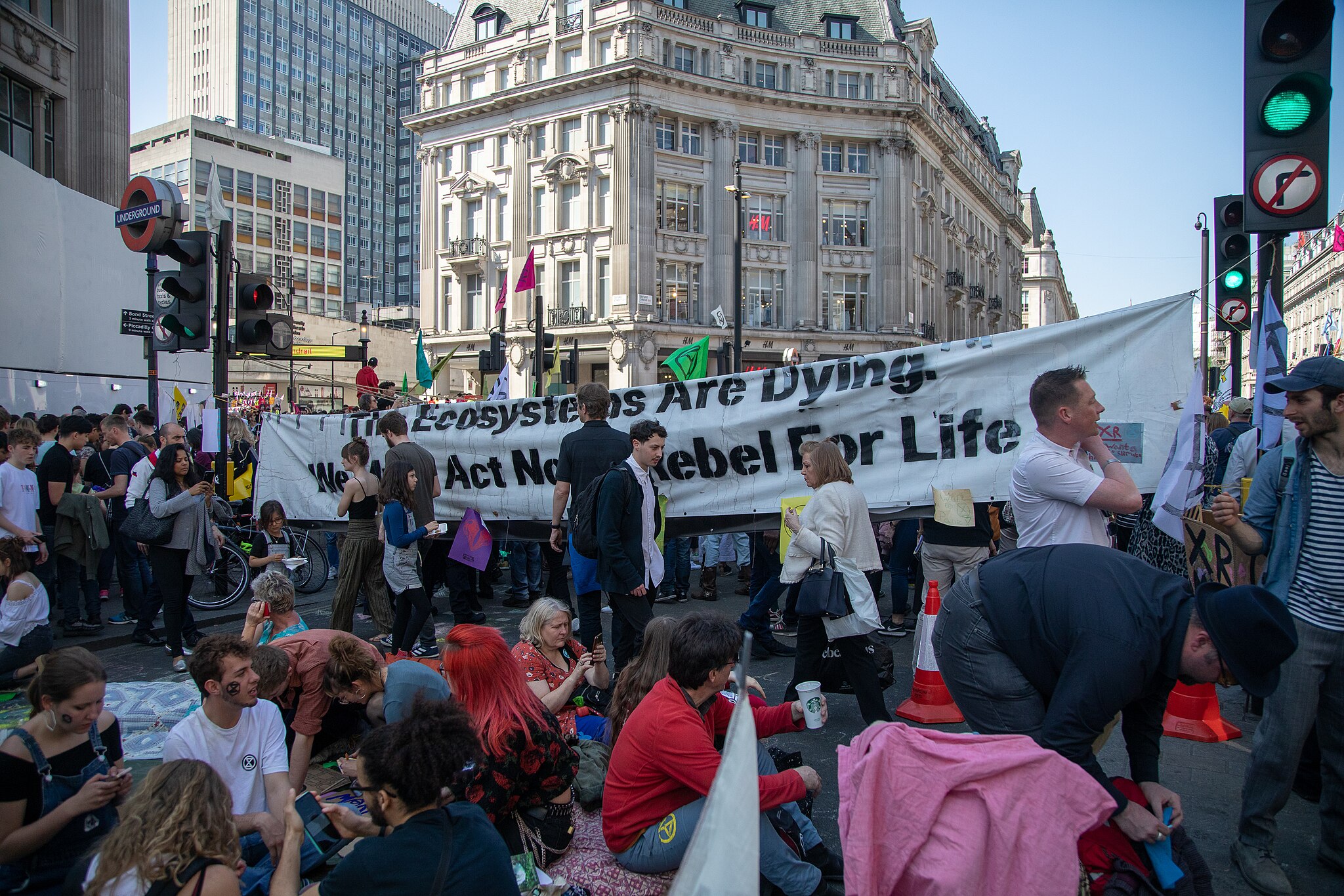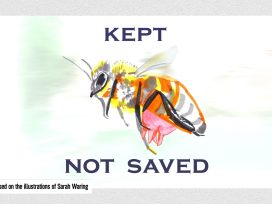
The visions of an apocalypse peddled by nihilistic humanists and misanthropic transhumanists confuse the destruction of humankind with salvation.
Just like climate activists today, conscientious objectors in the two World Wars broke the law to do the ‘right thing’. Though often ostracised by society at large, communities of dissent provided support in fighting battles of conscience, as the history of British pacifism shows.
On 16 February this year, seven Just Stop Oil protesters were found guilty of peacefully blocking the distribution of oil from the Esso Fuel Terminal in Birmingham. All were sentenced to 12 months conditional discharge with costs of up to £500. However, it was the views of District Judge Wilkinson, in sentencing them, that caught the news. ‘It is abundantly clear that you are all good people,’ he said. ‘It’s unarguable that man-made global warming is real and we are facing a climate crisis. That is accepted and recognised by the scientific community and most governments (including our own).’ Nevertheless, Wilkinson was forced by his position to conclude: ‘If good people with the right motivation do the wrong thing it can never make that wrong thing right.’
When is it morally justified to assert the primacy of the individual conscience against the law of the land? My interest in this question emerged from my research into the moral dilemmas caused by pacifism during the First and Second World Wars. Like the Just Stop Oil protesters, conscientious objectors (COs) to military conscription were doing the ‘wrong thing’ (breaking the law) in order to do what they believed to be the ‘right thing’, provoking an often hostile response from the general public.
In her 1987 book Troublesome People, writer and historian Caroline Moorehead charts the history of pacifism in Britain between 1916 and 1986. Among other harrowing stories, she describes the degrading brutality exercised against vulnerable young men who on ethical or religious grounds refused to put on uniform or carry weapons during the First World War.
‘You are not old enough to have a conscience,’ was the verdict used by the tribunal chairman at Kingston Barracks to dismiss one man’s appeal. These young men were old enough to die, but not to ask why.
Of 16,000 men summoned to tribunal during the First World War, around 6,000 were arrested and court-martialled (some as many as six times); 819 had spent over two years in prison, much of that time on bread and water and in solitary confinement; 69 were dead; and 39 had, in Moorehead’s words, ‘gone mad’. This is partly why she described pacifism as ‘the most lonely of beliefs, held for the most part in private, and sustained in isolation, often in the face of powerful opposition’. Ostracized by other family members, spat at in the street, in prison they were often kept in solitary confinement in cells without bedding, and starved. In one incident, 35 men were sent to France to face a mock execution for desertion.
However, Moorehead’s grim account is tempered by Cyril Pearce’s more recent study, Communities of Resistance: Conscience and Dissent in Britain During the First World War (2020). The book notes that some COs were supported by ‘an extensive and vigorous local social, religious and political culture’, in which dissenting views were allowed to flourish. Such supportive cultures kept the spirits of those imprisoned alive, reassuring them that they were not alone. Pearce argues that there was a ‘geography of dissent’, related to the strength of local political and religious movements, whether it was the Independent Labour Party, the Quakers or some other affiliation.
The ideals of pacifists, whether the ‘absolute refusers’ or those prepared to drive ambulances, fire-watch or undertake farm work, were a mixture of religious, political and other beliefs and affiliations. The absolutists were likely to be of an unbending religious faith. In Battles of Conscience, Tobias Kelly’s recent study of British Second World War pacifism, he notes that tribunals were readier to accept the arguments of those who took their position on the basis of religious injunction – predominantly Methodists, Anglicans, Brethren, Quakers, Baptists, Christadelphians and Jehovah’s Witnesses.

Extinction Rebellion protesters in London on Friday 19th April. Image via Wikimedia commons.
Yet this was also a time when rationalist and humanist values were being advanced through the writings and anti-war activities of people such as Fenner Brockway and Bertrand Russell, founding fathers of modern humanism. Imprisoned as a war-resister for six months during the First World War, it was Russell who famously and bitterly wrote that ‘War does not determine who is right – only who is left.’
We can see in the early pacifist movement the seeds of a culture of dissent and protest which was to gain ground in the 20th century. War resistance was the clear forerunner of the modern discourse of human rights, of which conscientious objection to military conscription was an early demand, now recognised by governments throughout the world, in word if not in deed. Moreover, the forms of non-violent resistance pioneered by pacifist and anti-war movements – described in Václav Havel’s famous essay as ‘The Power of the Powerless’ – were later emulated by Gandhi in India and the civil rights movement in America. They have since been adopted by many other social movements, for example at Greenham Common, in relation to women’s rights and the treatment of refugees, and later by campaigns such as Extinction Rebellion, Insulate Britain and Just Stop Oil.
Being part of communities of dissent could mean ostracism by society at large. But this was not always the case. In my research, I came across one inspiring incident in a collection of reminiscences published by Essex Quakers who had refused conscription during the Second World War. In 1940, hospital worker Albert Pike was sent to Romford Labour Exchange to find a job. He was a conscientious objector, having registered himself as unwilling to fight after Britain and France invaded Germany the year before. ‘All eyes were on me when I walked forward to answer the clerk’s shout of ‘Where’s that CO?’’ he recalled. ‘Afterwards a number of men came up to shake my hand. I am sure the clerk was as surprised as I was at the reception I got from the crowd.’
Pike went on to help establish a farming community in Essex, with a group of other COs, some of whom were Quakers. I was so taken with the story, I wrote a book about this movement: No Matter How Many Skies Have Fallen: Back to the Land in Wartime Britain. Frating Hall Farm, in Colchester, was one of a number of communities formed during the Second World War, as pacifists turned to land colonies, smallholdings and the resettlement of vacant farms as an alternative to taking up arms. Designated as a ‘reserved occupation’, farm work was an alternative to joining the armed forces.
One reason COs were treated more leniently during the Second World War was that many were themselves war veterans. Three of Frating’s mentors – Max Plowman, John Macmurray and Richard Rees – had fought in the trenches and been decorated for bravery. They had seen the worst and were not prepared to see it happen again, and their war records gave them the moral authority to say so. This support for the back-to-the-land movement was shared by their friend Vera Brittain, whose war memoir and elegy for a lost generation, Testament of Youth, stirred the national conscience when published in 1933. Brittain helped finance the Frating community in its early days. Her daughter, Shirley Williams, later to become a Labour cabinet minister, worked there for a year as a young woman as ‘second cowman’, recalling it as one of the happiest times of her life.
Those I interviewed about the Frating community had been there as children and remember it as a time of enormous freedom and even privilege. While some experienced a degree of hostility or scorn at school as a result of their parents’ beliefs, it was much harder for the adults. They were widely viewed with suspicion and on occasions ostracized, encouraged by a hostile press, compounded by their decision to offer shelter to foreign refugees and even former prisoners-of-war. The Frating farmers understood that it wasn’t enough to be against something, one had to be for something better. Going back to the land not only provided a legitimate means of helping others while holding fast to unpopular beliefs: it also allowed them to create an enclave of dissent and fellowship.
What is evident in the work of Kelly, Moorehead and Pearce is the intransigence of certain political and religious formations in resisting the overweening power of the state and popular opinion in times of extreme crisis. ‘In theory, conscience could be secular or religious,’ Kelly argued in Battles of Conscience, ‘but since the Reformation, if not earlier. . . to talk about conscience was to talk about religion and a very particular religion at that; conscience seemed to walk most comfortably in Britain in the footsteps of Protestant forms of faith.’
Yet conscience is not the exclusive domain of religion. The connections between pacifism, political resistance and humanism were made in two now famous talks by Bertrand Russell and Jean-Paul Sartre. The first was Russell’s lecture to the National Secular Society at Battersea Town Hall on 6 March 1927, published as Why I Am Not a Christian, and later described by New York Public Library as ‘among the most influential books of the 20th century’. Russell’s argument against the existence of God was eloquent and even-tempered. While understanding the need for a redemptive power that could ameliorate the carnage of war, Russell concluded by reasoning that humankind must find a way of making the world a better place without recourse to divine intervention, particularly when it came to war. From then on Russell became an international figurehead of the peace and humanist movements right up to his death in 1970.
Sartre’s talk in Paris on 29 October 1945, published as Existentialism Is a Humanism, seized the imagination of a generation. Though Sartre later came to regret its simplistic reasoning, his short book made sense to many young readers – myself included, many years later. Starting from Ivan Karamazov’s provocative assertion in Dostoevsky’s novel The Brothers Karamazov that ‘If God did not exist, everything would be permitted,’ Sartre argues that it is precisely because there is no God that each individual has to take responsibility for her or his own actions.
The lecture was delivered within months of the end of the Second World War, at a time of national introspection. Sartre posed the problem of a young man who cannot decide whether to join the French resistance against the Nazi occupation or stay at home caring for an ailing parent. Although Sartre himself joined the Resistance, and fought with the French army, he provides no answer, only observing that in weighing up any such decision we are required to understand more precisely who we are, and whether we are living an ‘authentic’ life, or what the ‘secular but spiritual’ Václav Havel was later to describe as ‘living in truth’. More recently philosopher Lea Ypi, writing of her childhood in communist Albania, argues that in the face of oppression and political corruption, ‘We never lose our inner freedom: the freedom to do what is right.’
What might we learn today from these battles of conscience? One lesson is that doing the right thing is hard when you are in a minority, though it helps if there is a supportive culture of dissent.
Soon after lockdown ended, I got in touch with David Lambert, an old friend I’d promised to visit before Covid struck. In the four years since we’d last seen each other, he had spent the first three with Extinction Rebellion, and was working out where the environmental movement goes next. Even XR’s ‘end of life as we know it’ message had not really cut through, he thought, and the political parties had managed to deflect its sense of urgency. For two weeks in April 2021, David and others appeared at Southwark Crown Court charged with criminal damage to the Shell Building. In the journal Self & Society he wrote that in court he and his fellow protesters decided, ‘We would tell our truth, share with the jury not just our grief and anger, but also our uncertainty. We admitted we did not know whether what we did was the right thing to do; we believed it was but we were offering it to the jury to decide.’ All were acquitted. It seems Judge Wilkinson was not alone in his courtroom sympathies (although, it should be noted, it has not played out this way for everybody, with harsher anti-protest laws introduced in the two years since then and jury verdicts varying).
The old story of ‘going after the bad guys’ no longer had traction in the face of the enormity of the climate crisis, David told me. Better to admit to the grief and uncertainty of the sixth great extinction, and let others decide how they are to live with that radical uncertainty. He quoted an early XR slogan, ‘Hope dies; action begins’, citing American scholar Joanna Macy’s distinction between the practice of what she calls ‘active hope’ and an increasingly desperate hopefulness that we can continue as we are. The more that radical social change is framed as a binary conflict between the forces of light and the forces of darkness, he said, the less people will listen or ‘own’ the environmental crisis, let alone the need for change.
In my book about Frating Hall Farm I described how the community’s children remembered idyllic years, while aware that their parents struggled with hard work, lack of experience, poor conditions and personal and ideological differences. Yet none of the adults appear to have regretted the experience. In later life they remembered the friendship, discussions, concerts, the summer harvest evenings and suppers, and forgot the winter’s cold and the wet days pulling up cabbages. More importantly, their children were proud of them, and still are 70 years later.
To win the respect of the next generation is no small achievement. How many of us will be able to say the same? Or will future generations look back at us as the cohort who failed to act on our principles, who let the world go to ruin? When Joe Watson, a former steel-worker and pacifist, helped establish the community at Frating in 1943, he wrote in a newsletter that ‘We did not wait, because there was nothing to wait for.’ Sometimes you just have to do the right thing.
Published 6 October 2023
Original in English
First published by New Humanist Autumn/2023
Contributed by New Humanist © Ken Worpole / New Humanist / Eurozine
PDF/PRINTSubscribe to know what’s worth thinking about.

The visions of an apocalypse peddled by nihilistic humanists and misanthropic transhumanists confuse the destruction of humankind with salvation.

Contrary to popular belief, not all bees make honey. In fact, less than 4% of the total population of 20,000 species around the world do. As we rush to #SaveTheBees, many don’t know how, or which ones face the real threat of extinction.